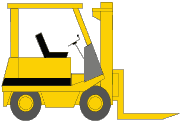Excerpted from PLANT ENGINEERING magazine, December 1947, p 74.
Material handling adds nothing to the value of the merchandise or product, but only adds to the
cost of its production. That is why industrial engineers consider it to be one of the few remaining operations
in which it is still possible for industries to cut product costs drastically. The mechanized industrial truck
ranks high in the list of aids on which management can call to achieve the goal of higher production at lower cost.
The power truck is not a war baby, but it took the demands of war to forcibly bring
home to industrial management the full value of this equipment. The modern industrial truck with one-man operation
can accurately pick up, move, position, and deposit bulkier and heavier loads in faster time, with greater safety
to man and material than any known material handling device.
It provides mechanical handling for production and shipping operations which cannot
afford fixed systems of handling. A good floor plus battery-operated trucks provide a low-cost, flexible, dependable
system susceptible to infinite varieties of plans and rearrangement of machines, storage and warehouse areas, and
loading docks.
Early types of the industrial truck with a fixed platform were followed by a low-lift
platform design. This has the advantage in that it can be maneuvered under a skid which has been manually loaded.
The loaded skid can then be lifted clear of the floor, moved to another position, and deposited; and may be moved
from job-to-job without waiting for manual loading of the platform.
The next step was to make a truck that would lift the load high enough to permit
tiering the preassembled loads. This is the so-called high-lift platform truck. At first, this lift was less than
6 ft. Advances, however, now make it possible to tier loads at heights as great as 11 ft. Special telescopic devices
have been developed to increase this height and enable loads of 5 tons to be lifted and placed at extreme heights
by one man.
Contemporary with the low-lift truck was the development of the battery-powered industrial
tractor. This makes possible the assembly of loads on relatively low-cost platforms on wheels, commonly known as
live skids, tilers, buggies, flats, or dollies. They are moved in long trains over long distances on piers, warehouses,
railway terminals, and large factories. A power truck can make such huge savings in comparison to the cost
of manual handling that it need not be busy continuously to show a profit. In many instances a truck having no
more than an hour's work a day can pay for itself in a year.
Through the use of the Annual Operating Cost Summary Form developed by the Electric
Industrial Truck Association, it has been established that, based on present prices of equipment and power, the
cost of owning and operating a truck 8 hr a day, is approximately $1.91. Figuring the wages of the truck operator
at $1.00 per hr, gives, for only 1 hr operation, a cost of $2.91. For this amount 106 t. of material was moved
100 ft, that is 2.75 cents per ton or per 100 ton-ft.
Hand trucking costs will depend upon the trucker's wages. Taking this very conservatively
as 50 ct. an hr, the cost of movement of 3.5 t. would be 14.3 ct. a t. To move 106 t. the cost would be $15.00
as compared with $2.91 for the electric truck.
Assuming the truck was operated 7 out of 8 working hours, total movement would have
been 742 t. at a total cost of truck operation and labor of $8.91, or, a fraction more than 1 ct. a ton. To move
the same tonnage manually under the same conditions would cost 14.3 ct. per t. although the cost would have been
spread over a period of 212 hr or 26.5 working days -- the total cost $106.
 FORKLIFT OPERATION AND SERVICE.
FORKLIFT OPERATION AND SERVICE.
BE SURE TO VISIT THE HOME PAGE FOR INFORMATION ON LIFT TRUCKS REPAIR, SERVICE, TROUBLESHOOTING,
AND EVERYTHING YOU NEED TO KNOW ABOUT FORKLIFTS AND THEIR USE.

